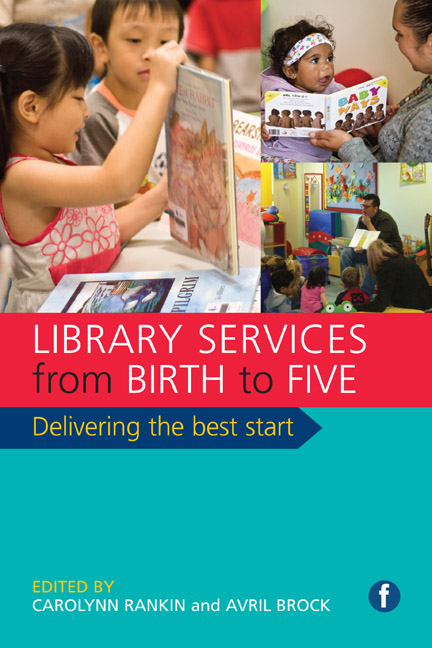Book contents
- Frontmatter
- Contents
- List of figures and tables
- Contributors
- Acknowledgements
- Introduction
- 1 Take them to the library: the pathway of opportunity
- 2 What you need to know about promoting early reading with young children from birth to five
- 3 Attribute value wrong, It should be `City of Literature ... it all starts with ABCD! The City of Melbourne and the Abecedarian Approach
- 4 Transforming practice through research: evaluating the Better Beginnings family literacy programme
- 5 People and partnerships, skills and knowledge
- 6 Resources for early years libraries: books, toys and other delights
- 7 Using digital media in early years library services
- 8 Using play to enhance early years literacy in babies and toddlers: ‘Read, Play and Grow’ at Brooklyn Public Library
- 9 Inclusive early literacy
- 10 Music and rhyme time sessions for the under-fives
- 11 Reaching your audience: the librarian's role
- 12 Successful library activities for the early years and ways to promote books effectively
- 13 Designing family-friendly libraries for the early years
- 14 Planning: organizing projects and money matters in the early years library
- Index
3 - Attribute value wrong, It should be `City of Literature ... it all starts with ABCD! The City of Melbourne and the Abecedarian Approach
Published online by Cambridge University Press: 08 June 2018
- Frontmatter
- Contents
- List of figures and tables
- Contributors
- Acknowledgements
- Introduction
- 1 Take them to the library: the pathway of opportunity
- 2 What you need to know about promoting early reading with young children from birth to five
- 3 Attribute value wrong, It should be `City of Literature ... it all starts with ABCD! The City of Melbourne and the Abecedarian Approach
- 4 Transforming practice through research: evaluating the Better Beginnings family literacy programme
- 5 People and partnerships, skills and knowledge
- 6 Resources for early years libraries: books, toys and other delights
- 7 Using digital media in early years library services
- 8 Using play to enhance early years literacy in babies and toddlers: ‘Read, Play and Grow’ at Brooklyn Public Library
- 9 Inclusive early literacy
- 10 Music and rhyme time sessions for the under-fives
- 11 Reaching your audience: the librarian's role
- 12 Successful library activities for the early years and ways to promote books effectively
- 13 Designing family-friendly libraries for the early years
- 14 Planning: organizing projects and money matters in the early years library
- Index
Summary
Introduction
Melbourne was designated as a UNESCO City of Literature in 2008, in recognition of its focus on literature as an art form, the high prevalence of bookshops and well-resourced libraries, and its investment in public programming promoting reading and engagement with literature. The National Year of Reading campaign has grown into a proactive movement across Australia in public libraries, schools and workplaces to promote the inherent ‘goodness’ of reading as well as the power of literacy to change lives. The Australian Bureau of Statistics’ Yearbook 2012, in its feature article on the National Year of Reading (Kelly and McKerracher, 2012) refers to the Adult Life Skills Survey conducted in 2006 which prompted libraries to act. The nation's statistician highlighted that literacy is ‘a basic prerequisite for full participation in Australian society’ (Pink, 2012, 1). This chapter will discuss the City of Melbourne's parenting education programme, which aims to make a difference by breaking cycles of disadvantage and thus contribute to Melbourne's status as a City of Literature (and literacy) for all.
Australian literacy levels
Alarmingly, Australia's literacy levels are dropping. In 2012, 46% of Australians did not meet Level 3 literacy standards. This includes functional literacy tasks like the ability to read newspapers and a novel for pleasure, decipher medicine-bottle information and read a recipe. There are significant issues associated with almost half the population of our country not meeting the literacy levels required for everyday functioning in today's society. As a state, Victoria is the second-lowest after Tasmania in its literacy levels, as identified by the Australian Bureau of Statistics in the same survey. Australia's literacy rates have dropped amongst OECD countries in recent years.
In Australia the federal and state governments have made commitments to the significance of learning to read and ‘keeping on’ reading. Initiatives include the Get Reading Campaign, the Centre for Youth Literature, South Australia's Little Big Books Club's It's Rhyme Time booklet and DVD, the Victorian Government's Young Readers Program, Western Australia's Better Beginnings Family Literacy Program, as well as federal government support for the National Year of Reading and National Literacy and Numeracy Week. However, no national universal early years-targeted literacy interventions are currently funded across Australia. Australia does not have a national reading or literacy strategy.
- Type
- Chapter
- Information
- Library Services from Birth to FiveDelivering the best start, pp. 65 - 80Publisher: FacetPrint publication year: 2019



